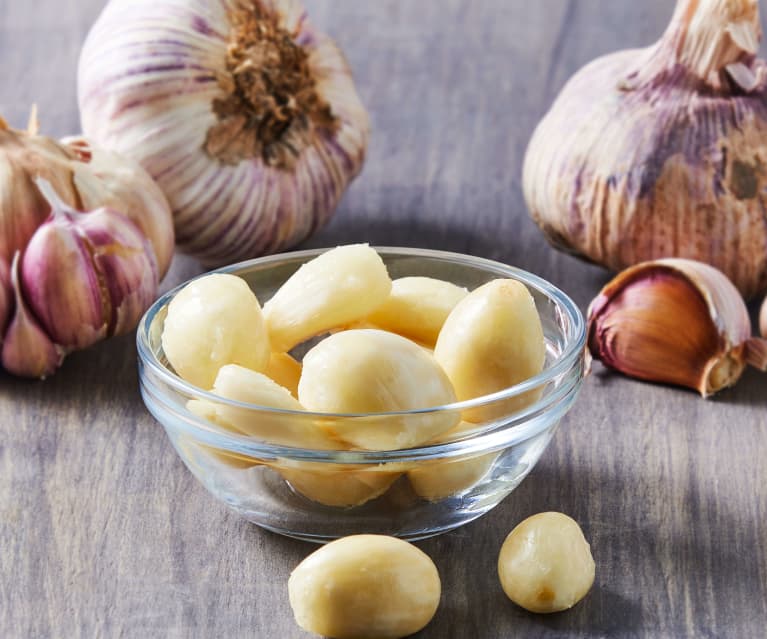Garlic and It’s Health Benefits
Did you know…garlic is one of the most widely celebrated ingredients throughout the world? More than just a flavor booster, garlic is used also used for its various medicinal qualities.
As stated by Dr. Joseph Mercola, research has demonstrated garlic’s health-boosting benefits due to its antimicrobial, anti-inflammatory, antithrombotic and antioxidant activities, to name a few. Studies also support the notion that this humble herb has anticancer effects, which should be good enough reason for you to include more of it in your diet.
Garlic and Anticancer Phytochemicals
Biomedicine and Pharmacotherapy conducted a study that highlights how garlic’s phytochemicals can help ward off cancer. According to the authors:
“Cancer researchers have identified that many of the phytochemicals of garlic have anticancer effects. Recently, we found that some components of garlic have novel therapeutic anticancer properties.
This review will discuss the anticancer mechanisms of garlic phytochemicals, showing their potential for cancer treatment in compared to conventional chemoprevention agents.”
It’s worth noting that garlic contains two variants of organosulfur compounds that are responsible for its health benefits. This includes oil-soluble compounds and water-soluble compounds.
The oil-soluble organosulfur compounds in garlic include alliin, allicin and ajoene. The main compound, allicin, is what gives garlic it’s most notable scent. Once macerated, the garlic then releases the compound alliinase, which changes the alliin to allicin.
Also noted in the study were the water-soluble compounds, S-allylcysteine, S-allylmercaptocysteine, metabolites allyl mercaptan and allyl methyl sulfide. These are the compounds that are responsible for the anti-cancer benefits of garlic.
“S-allylcysteine is an odorless, stable, water-soluble compound with antioxidant and cholesterol-lowering effects in clinical studies … Previous results have shown that S-allylcysteineacts as an effective agent against the malignant progression of human non-small cell lung carcinoma in both in vitro and in vivo model,” according to the study.
Garlic and the Fight Against Cancer
Through both human and animal studies, researchers have been able to show garlic’s ability to fight again cancer. As mentioned in the study,
“During the initiation stage, blocking phytochemicals prevents the bioactivation of carcinogens through antioxidation, antimutagenesis and detoxication. In the promotion stage, suppressing phytochemicals inhibits the proliferation of clonal cells by modulating protein folding and DNA repair.
In the progression stage, suppressing phytochemicals impedes the growth or metastasis of tumors by changing the cell behaviors, including antiproliferation, apoptosis and immunocompetence.”
It is further elaborated that the herb can help prevent the spread of cancer and tumor cells by blocking the signaling pathways for cell migration.
“We thought that garlic components not only have functions in the stages of cancer chemoprevention but also have uncovered potency for cancer therapy,” they said.
Garlic the Relapse Inhibitor
The International Journal of Herbal Medicine notes in a study that garlic can help prevent cancer from coming back. It does so by targeting the stem cells within the cancer.
With more conventional treatments cancer stem cells are often left behind. Once left behind they can metastasize and continue spreading.
The study used in-vitro testing using three different garlic extracts on a multitude of cancer cells. Each extract was made using fresh garlic. As stated in the study:
“Chemotherapeutic drugs end up killing cancer cells sparing cancer stem cells which after a while can give rise to a full-blown tumor with high metastatic potential. These drugs mainly involve the use of synthetic compounds.
Thus the need of the hour is to have a natural agent which can possess both anticancer and anticancer stem cell activity and additionally should have no or minimal effect on normal cell population.”
Benefit Your Health in Other Ways
Garlic is useful for more than just it’s anti-cancer benefits. Containing various bioactive compounds like organic sulfides and polysaccharides, the herb also contains phosphorus, potassium and zinc.
Garlic has many benefits, including but not limited to:
- Reducing inflammation
- Promoting heart health
- Reducing the risk of metabolic syndrome
- Boosting immunity
- Promoting skin and bone health
The Alternative
Garlic provides the most benefits when it is in its raw state. You can further those benefits by chopping or crushing the herb.
Is the raw garlic flavor a bit too much for you? Maybe you should give it’s sister, Black Garlic, a try. With a much milder flavor, it’s a bit more palatable to most.
Black Garlic and Brain Health
Studies show that aged black garlic extract has the potential to improve short-term memory. Additionally, it can also reduce neuroinflammation.
“Pretreatment of aged garlic extract alleviated the recognition memory impairment involving short-term memory in Aβ (1-42)-induced rats by decrease the density of CD11b-positive microglia immunoreactivity and the density of IL-1β in the injured brain. Therefore, we suggest that aged garlic extract could be a good supplementary food for the improvement of cognitive function in the elderly and AD patients.”
Furthermore, the study pointed out various other ways that black garlic may bolster brain health:
- Protecting against neurodegenerative conditions
- Preventing brain injury following ischemia
- Protecting neuronal cells against apoptosis
- Preventing β-amyloid-induced oxidative death
While Garlic Can Help…
Reducing the risk cancer can’t possibly rely on one ingredient alone. You also have to take into consideration your cellular health.
According to Dr. Joseph Mercola, “Virtually all major diseases like cancer, heart disease and obesity are linked to an inability to produce cellular energy due to impaired mitochondrial function. Without sufficient cellular energy, your body will not be able to fuel the innate repair and regeneration processes that are essential to disease prevention and recovery.
There are many factors that can compromise the integrity and functionality of your cells, but I believe there are four top culprits that can severely impact your mitochondrial energy production — excessive linoleic acid consumption, having high estrogen levels, endotoxin production, and chronic exposure to electromagnetic frequencies (EMFs) and 5G technology.
I believe that addressing these four factors will help repair your mitochondrial function and optimize your cellular energy production, and is the crucial first step toward warding off chronic diseases, not just cancer but virtually all chronic diseases plaguing the world today.”


